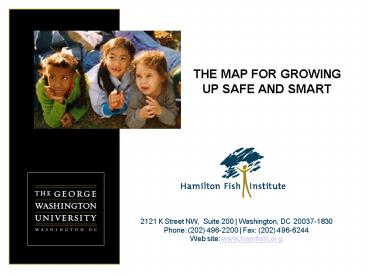2121 K Street NW, Suite 200 Washington, DC 200371830 - PowerPoint PPT Presentation
1 / 19
Title:
2121 K Street NW, Suite 200 Washington, DC 200371830
Description:
2121 K Street NW, Suite 200 | Washington, DC 20037-1830 ... The Map for Growing up Safe and Smart. Street map. School map. Agency map. Parks and recreation ... – PowerPoint PPT presentation
Number of Views:43
Avg rating:3.0/5.0
Title: 2121 K Street NW, Suite 200 Washington, DC 200371830
1
THE MAP FOR GROWING UP SAFE AND SMART
2121 K Street NW, Suite 200 Washington, DC
20037-1830 Phone (202) 496-2200 Fax (202)
496-6244 Web site www.hamfish.org
2
The Map for Growing UpSafe and Smart
- Dennis L. White, Hamilton Fish Institute on
School and Community Violence, The George
Washington University, Washington, DC - Kusi O. Akuoko, Franklin County Development
Department. Columbus, OH
3
The Map for Growing up Safe and Smart
- GIS mapping has become a strategic planning
tool for e-government. U.S. Department of
Justice, Office of Justice Programs, Office of
Juvenile Justice and Delinquency Prevention
(e.g., North Miami Beach Weed Seed Program,
Asset Map / Resource Map) - GIS mapping is an opportunity for parents to
support schools in a systematic way. In
particular, GIS enhances - - Positive contact between schools and parents,
and - - Sharing ideas among teachers and parents as to
what constitutes parental support.
4
The Map for Growing up Safe and Smart
- GIS mapping is an opportunity for parents to
get involved in decision making and advocacy for
higher levels of student achievement and greater
public support National PTA, National Standards
for Parent/Family InvolvementSchool Decision
Making and Advocacy. - GIS enhances the parents/adult caregivers
ability - - to take an active role in school,
- to understand what is being done in school and
the community, - to get organized, and
- to make it clear that the parent/adult caregiver
supports school policies and rules that help
create and sustain a safe place for all students
to learn (NCPC Be Safe and Sound Initiative). - Why? How?
5
The Map for Growing up Safe and Smart
- The common element among youth service
providers and the school is the child/youth. - School is the place where both positive and
disruptive behaviors are observed. - School is not the likely causal factor nor the
most important influence on, especially, the
disruptive behaviors. Family (immediate and
extended), community (within and beyond the
neighborhood), society at large, and the physical
environment are generally more influential.
6
The Map for Growing up Safe and Smart
- School just happens to be the place where we
observe the effects. - Parents are the first customers of school.
- Parents can be more informed customers by
- - knowing where youth spend their time and what
they do there, - - knowing where services for youth are available
and the extent of their availability, and - - knowing how the schools can coordinate services
and resources.
7
The Map for Growing upSafe and Smart
- Map youth services and resources
- Identify opportunities for improved support of
youth development - - multitude of influences
- - influences of family, community, and
environmental factors on learning and behavior - - the de facto role of schools
- Exercise What are the assets in your
community? (5 minutes) - Exercise Where are your children spending
their time? (5 minutes)
8
The Map for Growing up Safe and Smart
- Street map
- School map
- Agency map
- Parks and recreation
- Faith-based activities
- Public transit
- Crime
- Drugs
- Disadvantage index (from census tract data)
- School bus routes
9
(No Transcript)
10
(No Transcript)
11
(No Transcript)
12
(No Transcript)
13
(No Transcript)
14
(No Transcript)
15
(No Transcript)
16
(No Transcript)
17
(No Transcript)
18
The Map for Growing up Safe and Smart
- Other resources
- http//www.parents.ksaplus.com/framesplpubs.html
- GIS software
- http//www.esri.com/industries/k-12/index.html
- See the Education Users Conference.
- MapPoint Microsoft
- GeoLib project Florida State University
- http//www.geolib.org/about.cfm
19
CONTACT INFORMATIONDennis L. White, M.S.P.,
q.s.e.Hamilton Fish Institute2121 K Street NW,
Suite 200Washington, DC 20037-1830(202)
496-8491 phone(202) 496-6244 faxWeb site
www.hamfish.orgE-mail dlw_at_gwu.edu































